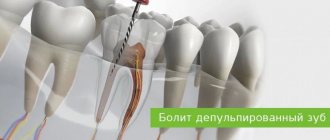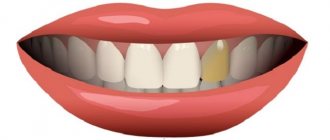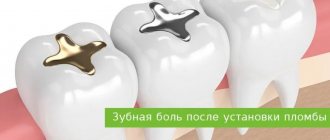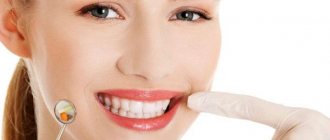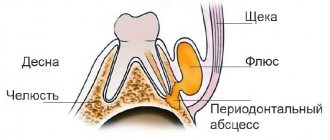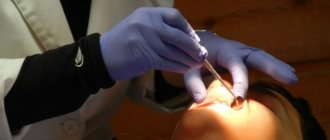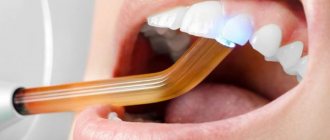Author of the article: Kondratyeva Tatyana Yuryevna, dentist, therapist of the highest category
“Tooth hurts when I bite!” It is with this phrase that patients often begin to describe their complaints at a dentist appointment. However, despite the fact that there is only one complaint, there may be several reasons for it, and in this note I will try to describe the main ones.
First, let's divide them into two groups:
Pain that appeared before visiting the dentist ; Pain that appeared after treatment by a dentist (yes, this also happens!).
Main reasons
Pain is a kind of “alarm” from the body, drawing attention to malfunctions in its functioning. The oral cavity is no exception: if a seemingly healthy tooth hurts when pressed, this indicates that something has happened to it. As a rule, the reason is damage to the crown, root, gums, or the presence of an inflammatory process. But provoking factors can be very diverse: injuries, infections, insufficient hygiene and even medical errors. Let's look at each case in more detail.
The tooth hurts when you press on it: after depulpation (nerve removal)
The pulp is nerve fibers and vessels that provide sensitivity and nutrition to the tooth. After their removal, the tooth is considered dead, and it may seem that this is the solution to any problem, because a dead tooth is unlikely to hurt. This is wrong. A pulpless tooth can be disturbing for several reasons:
- if the dentist, while cleaning the canals, punctured the root;
- when the thin end of the endoscopic instrument breaks off and remains inside the canal;
- in case the dental canals have not been completely cleaned and an infection remains in them.
In the first two cases, the pain is quite sharp: the pulpless tooth hurts not only when pressed, but even when touched lightly. If the dentist cleans the canals poorly, pain appears after some time. In any case, a tooth without a nerve that causes discomfort is a reason for a repeat visit to the dental office.
Tooth hurts when pressed after filling
Slight pain after the doctor has given a filling to the patient is normal: during the sanitization of cavities affected by caries, the tissues receive microtrauma. The condition is easily treated with analgesics and goes away on its own in 2-3 days. But if a filled tooth hurts when pressed hard enough, then the problem is one of five reasons:
- high filling - the occlusion is disrupted, the tooth experiences excessive pressure and becomes painful;
- the dental pulp was burned when the filling was treated with a photopolymer lamp;
- a gap has appeared between the filling and the enamel, into which bacteria and food particles have entered, causing inflammation;
- the cavities affected by caries were not drilled out thoroughly enough, and it reappeared;
- I developed an allergy to the filling.
If the tooth under the filling hurts when pressed, this means that you need to make an appointment with the doctor again and have it filled again.
The treated tooth hurts when pressed after canal filling
Working with roots requires precision and accuracy from the doctor. If he incorrectly assessed the depth of the canals, then the following complications cannot be excluded:
- a tooth without a nerve hurts when pressed if the filling material extends beyond the apex of the root, gets into the gum and puts pressure on it;
- when the channels, on the contrary, are not completely filled, inflammation may begin in the voids over time. If a lot of time has passed after visiting the doctor, and the tooth aches and hurts, then the problem is the unsatisfactory filling of the canals.
Why does a tooth that has no nerve hurt when pressed?
The onset of pain immediately after treatment may be a natural process.
The norm is a period of up to 2 weeks after visiting the dentist. This can be explained by the gums becoming inflamed after manipulation. You should also listen to your own feelings - whether the source of problems is the neighboring tooth, because the source of inflammation in the dentition is very easy to confuse. In this case, you will need treatment again, but without touching the recently placed filling.
The reaction to cold or hot temperature, its rapid changes, is a consequence of the exposure of soft tissues, which, with some stretch, can also be considered the norm in the first days after the procedure.
If the therapy is successful, the pain should gradually decrease until its intensity reaches a minimum. You should only worry when it grows and becomes unbearable over time. Then there is no need to wait 2 weeks, it is better to immediately make an appointment with your dentist. And if the specialist confirms that the painful sensations are localized precisely in the treated organ, then you need to understand why a tooth without a nerve aches and hurts when pressed or pressed and determine what to do in a particular case. Let's present a list of possible reasons:
- Poor hygiene, relapse and re-development of caries. Pathogenic bacteria can actively multiply due to plaque and food debris that accumulate in fissures (the so-called depressions on the chewing surface). Prevention can only be regular cleaning of the oral cavity, visiting the dentist twice a year for professional cleaning, as well as timely healing of even small carious lesions.
- A leaky seal. If the filling is of poor quality, gaps are allowed through which pathogenic bacteria can penetrate. In this case, the decomposition process occurs directly under the filling. This leads to the fact that it is very painful to press on a tooth without a nerve, as inflammation occurs at the root, periodontitis and its support in the bone - the dental-gingival ligament - is destroyed. As a result, rocking begins. Loosening is especially felt when chewing hard food.
- Root damage. If it was hurt during treatment, pain may be felt for a long time.
- Allergic reaction. May occur on painkillers, antiseptics.
- Poor quality materials for fillings, which cause significant shrinkage and the installation begins to move in the cavity, causing pain.
- A big mistake by the dentist: he could have left a microscopic foreign body in the canal, for example, a splinter from an instrument or the dentin itself, fibers from cotton wool.
- Increased fragility of tissues that do not contain pulp. Fragile roots are susceptible to splitting, and the appearance of a crack can become the root cause of painful sensations when chewing.
The tooth under the crown hurts when pressed
Crowns and bridges can also cause many unpleasant moments for their owner. Normally, you may feel discomfort under the crown for several days after installation, but as you adapt, the pain gradually goes away. If a month later the tooth still aches a lot and hurts when pressed, and also if the pain under the crown appears suddenly, this is a reason to consult a doctor.
There are four main reasons:
- the crown became loose, food particles and plaque accumulated under it, and inflammation began;
- the crown is cracked or split;
- the tooth is poorly ground under the crown;
- The shape of the crown is chosen incorrectly; it puts pressure on neighboring teeth or gums.
Prevention of pain after dental prosthetics
As with all dental procedures, the simplest and cheapest solution is to prevent the problem from occurring in the first place.
- If you have dental crowns or bridges, you should have a dental checkup at least once every 6 months. The dentist will monitor the condition of the teeth under the dentures, since they are initially at risk.
- Hardware cleaning of bacterial plaque and possible food debris will prevent the development of infections and caries; this procedure is mandatory along with normal home oral hygiene, including brushing teeth and using dental floss.
- It is also important to monitor the integrity of the dentures - avoid hard foods and excessive loads so that the denture is not damaged or its tight fit to the stump of the supporting tooth is broken.
Don’t endure pain after dentures - contact the orthopedists at the ILATAN family dentistry closest to your home to get advice and help. Registration is available by phone +7 (495) 748-50-50.
A healthy tooth hurts when pressed
What should you do if, when pressed, a tooth that has not been sanitized, depulped, drilled or loaded with a crown hurts? Yes, this happens too. Here are a few reasons why a seemingly healthy tooth can be painful.
- Periodontitis. This is an inflammatory disease of the tissues around the teeth. When pressed, both the gums and the tooth hurt at the same time. If no action is taken, progressive periodontitis will lead to a reduction in the volume of the gums and even bone, and then the tooth will become loose and may fall out.
- Excessive enamel sensitivity. It is provoked by chemical teeth whitening, after which even a tooth with a nerve can ache when biting or drinking cold and hot drinks. Teeth with filled canals do not have this problem. You can make your enamel less sensitive at home by using remineralizing gels and toothpastes.
- Removal of a tooth. After surgery, the adjacent healthy tooth may hurt. This is due to damage to soft tissues and does not require any additional therapy other than that prescribed by the doctor.
Pain in teeth when chewing, what can cause it and how to treat it?
Toothache is dangerous and insidious; it can manifest itself in various ways and be a signal of a serious illness. In some cases, pain appears suddenly and for a short time, and sometimes it is present for a long time and causes great inconvenience and discomfort. Pain may occur during chewing, when pressing on the tooth or when tapping on it. Each type of toothache is a sign of some kind of inflammatory process in the oral cavity or tooth.
Pain in the teeth when chewing is one of the types of toothache that causes significant discomfort when eating. There are several reasons that can contribute to this type of pain.
Causes of toothache when chewing:
- presence of caries;
- crack in the tooth;
- violation of tooth enamel;
- damaged filling or crown structure;
- the presence of a damaged dental nerve;
- formation of a cyst in the tooth;
- periodontitis;
- periodontitis;
- pulpitis, etc.
Toothache when chewing is a signal of one of these processes. It is very difficult to independently determine the cause of pain, so if you have such pain, you must definitely seek help from a specialist so that he can make the correct diagnosis and prescribe treatment as soon as possible. Lack of proper and timely treatment can lead to unwanted complications and the development of serious diseases.
What should you do if your tooth hurts when you press it?
Pain almost always accompanies the rehabilitation period after dental surgery. If the patient follows the doctor’s recommendations, the discomfort disappears on its own after 2-4 days, however, in some cases, pain can signal complications. The patient should return for a follow-up appointment if:
- immediately after the anesthesia wears off, severe and sharp pain appears;
- More than a week has passed after treatment, but the toothache does not go away;
- The rehabilitation period went well, but after 1-3 months pain appeared again.
The most important thing is not to endure, but to figure out where the pain comes from.
How to relieve pain
If a tooth hurts severely after treatment of pulpitis, taking a pain reliever (Analgin, Ibuprofen, Ketolac, etc.), rinsing the mouth with an antiseptic solution or a warm herbal decoction of lemon balm, sage, oak bark, chamomile, will help temporarily relieve the pain symptom and alleviate the condition. calendula.
It is strictly forbidden to heat a sore tooth, apply alcohol or garlic compresses to the gums, or take antibiotics or aspirin.
